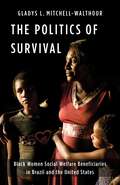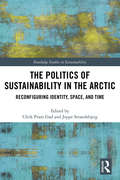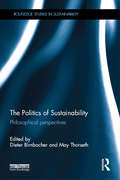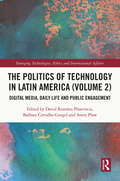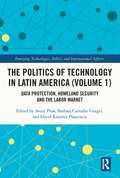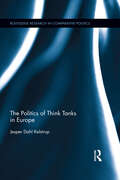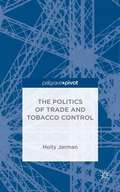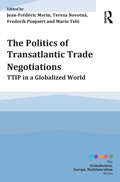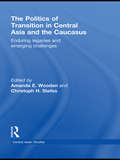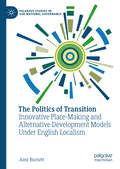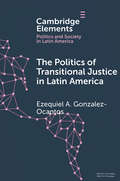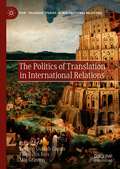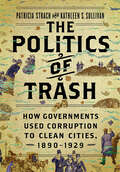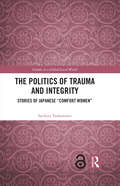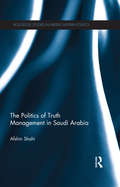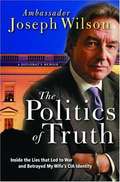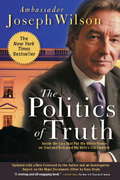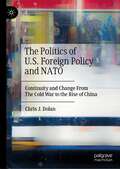- Table View
- List View
The Politics of Survival: Black Women Social Welfare Beneficiaries in Brazil and the United States (Black Lives in the Diaspora: Past / Present / Future)
by Gladys L. Mitchell-WalthourPoor Black women who benefit from social welfare are marginalized in a number of ways by interlocking systemic racism, sexism, and classism. The media renders them invisible or casts them as racialized and undeserving “welfare queens” who exploit social safety nets. Even when Black women voters are celebrated, the voices of the poorest too often go unheard. How do Afro-descendant women in former slave-holding societies survive amid multifaceted oppression?Gladys L. Mitchell-Walthour offers a comparative analysis of how Black women social welfare beneficiaries in Brazil and the United States defy systems of domination. She argues that poor Black women act as political subjects in the struggle to survive, to provide food for their children and themselves, and challenge daily discrimination even in dire circumstances. Mitchell-Walthour examines the effects of social welfare programs, showing that mutual aid networks and informal labor also play important roles in beneficiaries’ lives. She also details how Afro-descendant women perceive stereotypes and discrimination based on race, class, gender, and skin color. Mitchell-Walthour considers their formal political participation, demonstrating that low-income Black women support progressive politics and that religious affiliation does not lead to conservative attitudes.Drawing on Black feminist frameworks, The Politics of Survival confronts the persistent invisibility of poor Black women by foregrounding their experiences and voices. Providing a wealth of empirical evidence on these women’s views and survival strategies, this book not only highlights how systemic structures marginalize them but also offers insight into how they resist such forces.
The Politics of Sustainability in the Arctic: Reconfiguring Identity, Space, and Time (Routledge Studies in Sustainability)
by Jeppe Strandsbjerg Ulrik Pram GadThe Politics of Sustainability in the Arctic argues that sustainability is a political concept because it defines and shapes competing visions of the future. In current Arctic affairs, prominent stakeholders agree that development needs to be sustainable, but there is no agreement over what it is that needs to be sustained. In original conservationist discourse, the environment was the sole referent object of sustainability; however, as sustainability discourses have expanded, the concept has been linked to an increasing number of referent objects, such as society, economy, culture, and identity. This book sets out a theoretical framework for understanding and analysing sustainability as a political concept, and provides a comprehensive empirical investigation of Arctic sustainability discourses. Presenting a range of case studies from Greenland, Norway, Canada, Russia, Iceland, and Alaska, the chapters in this volume analyse the concept of sustainability and how actors are employing and contesting this concept in specific regions within the Arctic. In doing so, the book demonstrates how sustainability is being given new meanings in the postcolonial Arctic and what the political implications are for postcoloniality, nature, and development more broadly. Beyond those interested in the Arctic, this book will also be of great value to students and scholars of sustainability, sustainable development, and identity and environmental politics.
The Politics of Sustainability: Philosophical perspectives (Routledge Studies in Sustainability)
by Dieter Birnbacher May ThorsethResponsibility for future generations is easily postulated in the abstract but it is much more difficult to set it to work in the concrete. It requires some changes in individual and institutional attitudes that are in opposition to what has been called the "systems variables" of industrial society: individual freedom, consumerism, and equality. The Politics of Sustainability from Philosophical Perspectives seeks to examine the motivational and institutional obstacles standing in the way of a consistent politics of sustainability and to look for strategies to overcome them. It argues that though there have been significant changes in individual and especially collective attitudes to growth, intergenerational solidarity and nature preservation, it is far from certain whether these will be sufficient to encourage politicians into giving sustainable policies priority over other legitimate concerns. Having a philosophical approach as its main focus, the volume is at the same time interdisciplinary in combining political, psychological, ecological and economic analyses. This book will be a contribution to the joint effort to meet the theoretical and practical challenges posed by climate change and other impending global perils and will be of interest to students of environmental studies, applied ethics and environmental psychology.
The Politics of Teaching Palestine to Americans
by Marcy Jane Knopf-NewmanExplores how American youth are indoctrinated with Zionist mythology and how to intervene in that process by teaching about Palestine. It argues that as the relationship between Zionist education and the Israel lobby continues to be strong, it is necessary to correct the misrepresentations that infiltrate Western culture.
The Politics of Technological Progress: Parties, Time Horizons and Long-term Economic Development
by Joel W. Simmons"Why are some countries richer than others and why do some economies grow more rapidly? The Politics of Technological Progress answers these vital questions by highlighting the importance of technological progress for sustained economic development. The author also explains why some countries exhibit faster technological progress than others. Armed with a wealth of cross-national empirical evidence, Professor Simmons stresses the importance of properly constructed political parties for establishing an environment conducive to technological progress. 'Well-institutionalized' ruling parties are essential for technological progress, he argues, because only in such parties are time horizons long enough for governments to accept the deferred returns that are an inherent feature of government efforts to encourage innovation and technology adoption in the economy"--
The Politics of Technology in Africa
by Iginio GagliardoneAs more Africans get online, information and communication technologies (ICTs) are increasingly hailed for their transformative potential. Yet, the fascination for the possibilities of promoting more inclusive forms of development in the information age have obfuscated the reality of the complex negotiations among political and economic actors who are seeking to use technology in their competition for power. Building on over ten years of research in Ethiopia, Iginio Gagliardone investigates the relationship between politics, development, and technological adoption in Africa's second most populous country and its largest recipient of development aid. The emphasis the book places on the 'technopolitics' of ICTs, and on their ability to embody and enact political goals, offers a strong and empirically grounded counter-argument to prevalent approaches to the study of technology and development that can be applied to other cases in Africa and beyond.
The Politics of Technology in Latin America Volume 2: Digital Media, Daily Life and Public Engagement (Emerging Technologies, Ethics and International Affairs)
by Avery Plaw David Ramírez Plascencia Barbara Carvalho GurgelThis volume focuses on the hyper-mediatization of Latin America from the citizen’s perspective, considering the social impact and how people embrace information technologies to improve their living conditions, engage in political issues and the role of digital journalism in promoting democratic values in Latin America. The book is divided into three parts: ‘Digital Media and Daily Life in Latin America’ explores cases related to the integration of digital media such as mobile devices, social platforms and, even, drones to diverse commercial, private and social activities. ‘Information technologies and civic engagement’ gives special attention to the new political practices triggered by the irruption of smartphones and platforms, especially inside organizations and social movements in Latin America. ‘Journalism and Media Integrity in the Age of Post-truth’ centers on the study of digital journalism and the new media landscape, and related issues like precarization of labor conditions and the crisis of reliability in media. This second volume in a two volume set will be important reading for scholars and students of social use of digital media in Latin America, civic engagement, and the connections between politics, journalism and technology.
The Politics of Technology in Latin America: Data Protection, Homeland Security and the Labor Market (Emerging Technologies, Ethics and International Affairs)
by Avery Plaw David Ramírez Plascencia Barbara Carvalho GurgelThis book analyses the arrival of emerging and traditional information and technology for public and economic use in Latin America. It focuses on the governmental, economic and security issues and the study of the complex relationship between citizens and government. The book is divided into three parts: • ‘Digital data and privacy, prospects and barriers’ centers on the debates among the right of privacy and the loss of intimacy in the Internet, • ‘Homeland security and human rights’ focuses on how novel technologies such as drones and autonomous weapons systems reconfigure the strategies of police authorities and organized crime, • ‘Labor Markets, digital media and emerging technologies’ emphasize the legal, economic and social perils and challenges caused by the increased presence of social media, blockchain-based applications, artificial intelligence and automation technologies in the Latin American economy. This first volume in a two volume set will be important reading for scholars and students of governance in Latin American, the protection of human rights and the use of technology to combat crime and the new advances of digital economy in the region.
The Politics of Think Tanks in Europe (Routledge Research in Comparative Politics)
by Jesper Dahl KelstrupIn the 21st century, think tanks have become more than a buzzword in European public discourse. They now play important roles in the policy-making process by providing applied research, building networks and advocating policies. The book studies the development of think tanks and contemporary consequences in the United Kingdom, Germany, Denmark and at the EU-level. A Continental think tank tradition in which the state plays a pivotal role and an Anglo-American tradition which facilitates interaction in public policy on market-like terms have shaped the development of think tanks. On the basis of a typology of think tanks, quantitative data and interviews with think tank practitioners, the interplay between state and market dynamics and the development of different types of think tanks is analysed. Although think tanks develop along different institutional trajectories, it is concluded that the Anglo-American tradition has had a significant, cross-cutting impact in Europe in recent years. The contention over the politics of think tanks runs deeper at the EU-level than in the member states and reflects disagreement over how the EU should develop in the future. This text will be of key interest to scholars, students and practitioners of political communication, public policy, European politics and comparative politics.
The Politics of Third Countries in EU Security and Defence: Norway, Brexit and Beyond
by Øyvind SvendsenThis book examines security and defence cooperation between the EU and third countries, in particular the United Kingdom and Norway. Brexit has placed the question of third-party engagement firmly back in the spotlight, especially given the UK’s significance as a security and defence actor, and the failure of both sides to agree terms for cooperation in this area. The book explains why the seemingly obvious need for cooperation and shared strategic interests alone does not lead to frictionless cooperation or integration between the EU and like-minded third countries. Adding a theoretical and conceptual depth to what is still largely an empirical topic, it draws important conclusions about the possibilities and limits of European security and defence cooperation during challenging times. It also raises key questions about the nature and suitability of the pre-existing security and defence architecture in Europe, and the place of non-EU members within it. The book will appeal to academics and students interested in European politics, EU security, and security and defence studies.
The Politics of Time: Gaining Control in the Age of Uncertainty (Pelican Books)
by Guy Standing'Guy Standing's books have, over the years, pieced together a necessary political and intellectual agenda ... His Politics of Time is a splendid and timely addition to this body of important work' Yanis VaroufakisTime has always been political. Throughout history, how we use our time has been defined and controlled by the powerful, and today is no exception. But we can reclaim control, and in this book, the pioneering economist Guy Standing shows us how.The ancient Greeks organised time into five categories: work, labour, recreation, leisure and contemplation. Labour was onerous, whereas leisure was schole, and included participation in public life and lifelong education. Since the industrial revolution, our time has been shaped by capitalism, our jobs are supposed to provide all meaning in life, our time outside labour is considered simply 'time off', and politicians prioritise jobs above all other aspects of a good life.Today, we are experiencing the age of chronic uncertainty. Mental illness is on the rise, some people are experiencing more time freedom while many others are having more and more of their time stolen from them, particularly the vulnerable and those in the precariat.But there is a way forward. We can create a new politics of time, one that liberates us and helps save the planet, through strengthening real leisure and working together through commoning. We can retake control of our time, but we must do it together.
The Politics of Torture
by Tracy LightcapWhy did it happen? Why did the United States begin to torture detainees during the War on Terror? Instead of an indictment, this book presents an explanation. Crises produce rare opportunities for overcoming the domestic and foreign policylogjams facing political leaders. But what if the projects used to address the crisis and provide cover for their domestic policy initiatives come under serious threat from clandestine opponents? Then the restraints on interrogation can be overwhelmed, leading to the creation ofinformal institutions that allow the official establishment of torture. These ideas are tested using comparative historical narratives drawn from two cases where torture was adopted - the War on Terror and the Stalinist Terror - and one where it was not - the Mexican War. The book concludes with some thoughts about how the United States can avoid the legal establishment of torture in the future.
The Politics of Trade and Tobacco Control
by Holly JarmanPublic health policies are increasingly the subject of global trade and investment disputes. What are the consequences of this trend for existing and future policies designed to protect the public interest? This book uses the concept of political conflict to examine the effects of globalization on tobacco control policies. Arguing that the scope of a political conflict - which voices can be heard in a particular debate, and which individuals or groups are excluded - has a significant effect on support for public health policies, the book examines how the global trading system has narrowed the scope of conflicts over tobacco control. Analyzing challenges to policies enacted by Australia, Canada, the United States, the European Union and Uruguay, this book offers a critical look at the exclusionary global trading system and outlines what can be done to fix it.
The Politics of Transatlantic Trade Negotiations: TTIP in a Globalized World (Globalisation, Europe, Multilateralism series)
by Mario Telò Frederik Ponjaert Jean-Frederic Morin Tereza NovotnáBy focusing on the wider process of negotiations, this novel volume presents the first systematic analysis of the Transatlantic Trade and Investment Partnership (TTIP). The authors include outstanding scholars and relevant practitioners from across disciplines and various academic institutions around Europe and North America, but also from outside of the transatlantic basin. While presenting a thorough examination of the process of TTIP negotiations, the volume is divided into four parts with each part examining a broader theme and offering three or four shorter exploratory chapters that are accessible to academics, students, policy-makers and a wider audience. The volume explores historical and theoretical aspects of TTIP (with chapters by Gamble, Keohane and Morse, Telò), the beginnings of the TTIP talks and the role of individual actors (Mayer, Novotná, Dür and Lechner, Strange), TTIP’s possible knock-on effects and consequences for third parties (Aggarwal and Evenett, Duchesne and Ouellet, Zhang, Ponjaert) as well as impact on multilateral institutions and regimes complexes (Mavroidis, Mortensen, Meunier and Morin, Pauwelyn). The authors highlight dynamics which underline the relationship between the United States and the European Union and argue that TTIP promises to have vast implications not just for economics but global governance and international system.
The Politics of Transition in Central Asia and the Caucasus: Enduring Legacies and Emerging Challenges (Central Asian Studies)
by Christoph H. Stefes Amanda E. WoodenMost books on the Caucasus and Central Asia are country-by-country studies. This book, on the other hand, fills a gap in Central Eurasian studies as one of the few comparative case study books on Central Eurasia, covering both the Caucasus and Central Asia; it considers key themes right across the two regions highlighting both political change and continuity. Comparative case study chapters, written by regional experts from a variety of methodological backgrounds, provide historical context, and evaluate Soviet political legacies and emerging policy outcomes. Key topics include: the varied types and sources of authoritarianism; political opposition and protest politics; predetermined outcomes of post-Soviet economic choices; social and stability impacts of natural resource wealth; variations in educational reform; international norm influence on gender policy and the power of human rights activists. Overall, the book provides a thorough, up-to-date overview of what is increasingly becoming a significant area of concern.
The Politics of Transition: Innovative Place-Making and Alternative Development Models Under English Localism (Palgrave Studies in Sub-National Governance)
by Amy BurnettThis book explores the impact of recent planning reforms on emergent, alternative models of local governance. It uses the pioneering approach of Frome in Somerset, UK to showcase development and governance alternatives in a post-Brexit landscape. It investigates the role of planning in contributing to sustainable development under localism, and examines how key actors have used the Neighbourhood Planning process to put forward niche, community-based development futures. In doing so, the book offers valuable methodological, empirical and theoretical contributions to wider debates concerning transition, placemaking, local politics and planning. It will appeal to all those interested in public policy and governance.
The Politics of Transitional Justice in Latin America: Power, Norms, and Capacity Building (Elements in Politics and Society in Latin America)
by Ezequiel A. Gonzalez-OcantosHow has Latin America pioneered the field of transitional justice (TJ)? Do approaches vary across the region? This Element describes Latin American innovations in trials and truth commissions, and evaluates two influential models that explain variation in TJ outcomes: the Huntingtonian and Justice Cascade approaches. It argues that scholars should complement these approaches with one that recognizes the importance of state capacity building and institutional change. To translate domestic/international political pressure and human rights norms into outcomes, states must develop 'TJ capabilities'. Not only should states be willing to pursue these highly complex policies, they must also develop competent bureaucracies.
The Politics of Translation in International Relations (Palgrave Studies in International Relations)
by Zeynep Gulsah Capan Filipe Dos Reis Maj GrastenThis volume concerns the role and nature of translation in global politics. Through the establishment of trade routes, the encounter with the ‘New World’, and the circulation of concepts and norms across global space, meaning making and social connections have unfolded through practices of translating. While translation is core to international relations it has been relatively neglected in the discipline of International Relations. The Politics of Translation in International Relations remedies this neglect to suggest an understanding of translation that transcends language to encompass a broad range of recurrent social and political practices. The volume provides a wide variety of case studies, including financial regulation, gender training programs, and grassroot movements. Contributors situate the politics of translation in the theoretical and methodological landscape of International Relations, encompassing feminist theory, de- and post-colonial theory, hermeneutics, post-structuralism, critical constructivism, semiotics, conceptual history, actor-network theory and translation studies. The Politics of Translation in International Relations furthers and intensifies a cross-disciplinary dialogue on how translation makes international relations.
The Politics of Trash: How Governments Used Corruption to Clean Cities, 1890–1929
by Kathleen S. Sullivan Patricia StrachThe Politics of Trash explains how municipal trash collection solved odorous urban problems using nongovernmental and often unseemly means. Focusing on the persistent problems of filth and the frustration of generations of reformers unable to clean their cities, Patricia Strach and Kathleen S. Sullivan tell a story of dirty politics and administrative innovation that made rapidly expanding American cities livable. The solutions that professionals recommended to rid cities of overflowing waste cans, litter-filled privies, and animal carcasses were largely ignored by city governments. When the efforts of sanitarians, engineers, and reformers failed, public officials turned to the habits and tools of corruption as well as to gender and racial hierarchies.Corruption often provided the political will for public officials to establish garbage collection programs. Effective waste collection involves translating municipal imperatives into new habits and arrangements in homes and other private spaces. To change domestic habits, officials relied on gender hierarchy to make the women of the white, middle-class households in charge of sanitation. When public and private trash cans overflowed, racial and ethnic prejudices were harnessed to single out scavengers, garbage collectors, and neighborhoods by race. These early informal efforts were slowly incorporated into formal administrative processes that created the public-private sanitation systems that prevail in most American cities today. The Politics of Trash locates these hidden resources of governments to challenge presumptions about the formal mechanisms of governing and recovers the presence of residents at the margins, whose experiences can be as overlooked as garbage collection itself. This consideration of municipal garbage collection reveals how political development often relies on undemocratic means with long-term implications for further inequality. Focusing on the resources that cleaned American cities also shows the tenuous connection between political development and modernization.
The Politics of Trauma and Integrity: Stories of Japanese "Comfort Women" (Gender in a Global/Local World)
by Sachiyo TsukamotoThe Politics of Trauma and Integrity uses the lenses of gender and trauma to tell the stories of narratives testified by two contrasting Japanese "comfort women" survivors. Through an innovative interdisciplinary study of the politics of gendered memory and trauma in historical context, with numerous primary sources for analysis including diaries, interviews, letters and oral testimonies, this book uncovers the life-or-death struggles of Japanese survivors in pursuit of public recognition as the victims of state violence against women. It is set within a gender history of modern Japan, supplemented by feminist activist methodology premised upon political agency that seeks social justice. The author’s analysis draws upon three key concepts: trauma, coherence of the self, and integrity. Focusing upon the role of gender and trauma as the nexus between memory construction and identity formation in modern Japan, the author reveals these women’s relentless quest for their recovery and creation of new identities. This book provides a better understanding of the victims of sexual violence and encourages readers to listen to the voice of trauma, as well as making a significant contribution to the existing research on the ongoing history of sexual violence against women in Japan, the rest of Asia and beyond. It will be of interest to scholars, researchers, activists and all who are interested in the issue of women’s human rights. It provides supplementary reading and research material for history and politics courses relating to Japan and East Asia, memory, identity, trauma, gender, war and feminist activism. This book will also be beneficial to victims of sexual violence as well as the counsellors/psychologists engaging with them.
The Politics of Trauma and Peace-Building: Lessons from Northern Ireland (Routledge Advances in European Politics)
by Cillian McGrattanIn marked contrast to literary, historical and cultural studies, there has been a limited engagement with the concepts and politics of trauma by political science and peacebuilding research. This book explores the debate on trauma and peacebuilding and presents the challenges for democratization that the politics of trauma present in transitional periods. It demonstrates how ideas about reconciliation are filtered through ideological lenses and become new ways of articulating communal and ethno-nationalist sentiments. Drawing on the work of Jacques Rancière and Iris Marion Young and with specific reference to the Northern Irish transition, it argues for a shift in focus from the representation of trauma towards its reception and calls for a more substantive approach to the study of democracy and post-conflict peacebuilding. This text will be of interest to scholars and students of peace and conflict studies, ethnic and nationalism studies, transitional justice studies, gender studies, Irish politics, nationalism and ethnicity.
The Politics of Truth Management in Saudi Arabia (Routledge Studies in Middle Eastern Politics)
by Afshin ShahiExploring the management of ‘truth’ in the Kingdom of Saudi Arabia, this book aims to investigate the ways in which the official ‘truth’ is constructed and institutionalised in the country. The Politics of Truth Management in Saudi Arabia argues that there are two interrelated notions which articulate the ways in which ‘truth’ is conceptualised in Islam. One, at macro level, constitutes the trans-historical foundational principles of the religion, a set of engrained beliefs, which establish the ‘finality’, and ‘oneness’ of Islam in relation to other competing narratives. The other, at a micro level, takes place internally to find ‘truth’ within the ‘truth’. Unlike Islamic truth at the macro level, which is entrenched, the Islamic truth at the micro level refers to the various attempts by different agencies to claim to have found the ‘truth’ within the ‘truth’. Wahhabism, which is the product of an eighteenth century revivalist movement, is portrayed as the most ‘authentic’ reading of Islam. It is seen as the raison d'être for the prevailing political mechanism in the country and is introduced as an example of truth management at the micro level. Arguing that truth is not born in a power vacuum and often its construction and institutionalisation signify domination in one way or another, this book will be of interest to students of Religion, Politics, and Saudi Politics more specifically.
The Politics of Truth: A Diplomat's Memoir
by Joseph WilsonAmbassador Wilson writes a very engaging memoir of how he wound up in the diplomatic service. We follow his career from support staff overseas, to ambassador of several small African nations. He was also the last charge d'affairs in Iraq after the war began in 1990. He tells the story of how he got tangled up in the hardball and brutal politics of the current Bush administration, and how it differs from the norms of civil discourse in politics, and even from the first Bush administration, which praised Wilson lavishly.
The Politics of Truth: Inside the Lies That Put the White House on Trial and Betrayed My Wife's CIA Identity
by Joseph WilsonOne of last year's most controversial books and a "New York Times" bestseller, with an investigative epilogue by a prominent Washington journalist and a new introduction by the author on the anatomy of the Bush administration's smear campaign against him.
The Politics of U.S. Foreign Policy and NATO: Continuity and Change From The Cold War to the Rise of China
by Chris J. DolanThis book argues that domestic politics and political pressures determine the extent of the U.S. role in the North Atlantic Treaty Organization (NATO) from the emergence of containment strategy against the Soviet Union to the Russian war in Ukraine. NATO has evolved in the domestic politics of U.S. foreign policy from a conventional military alliance to contain the Soviet Union during the Cold War to an important instrument in the competition against China and Russia. This book examines American domestic political implications of U.S. security commitments to NATO. It adopts a historical approach and places the U.S. foreign policy toward NATO on the domestic level of analysis by highlighting domestic political determinants in the foreign policymaking process. It also highlights the connections between the Biden Administration’s definition of a struggle between democracy and autocracy and the state of American democracy following the January 6th insurrection by far-right Trump extremists. U.S. These include the evolution of American attitudes towards NATO, societal and economic factors, and entrenched bureaucratic interests shaping U.S. foreign policy. The book incorporates the contributions of major theoretical works on the domestic political factors that shape foreign policy preferences and behavior to understand the extent to which domestic politics influences the historical evolution of the U.S. role in NATO and American foreign policy toward Europe.
